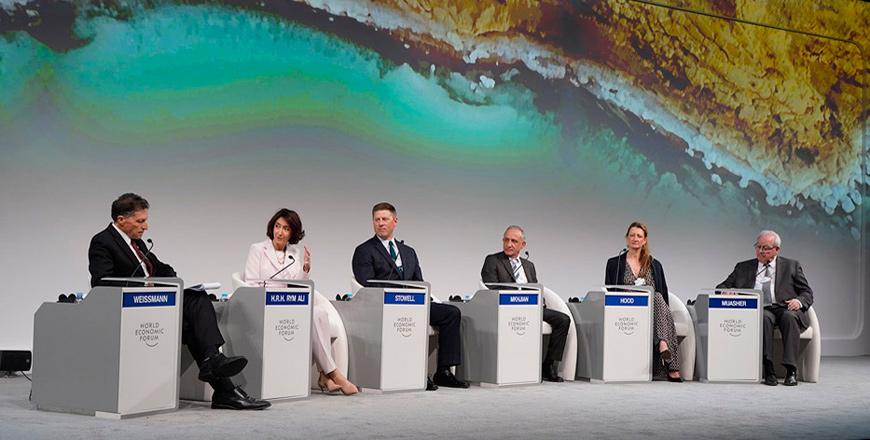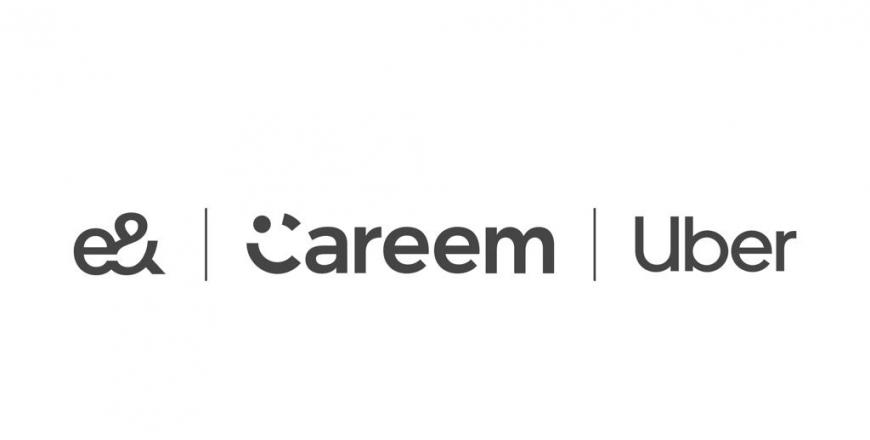You are here
WEF tackles 4th industrial revolution, need for regional education to keep pace
By JT - Apr 08,2019 - Last updated at Apr 08,2019

Deputy Prime Minister and Minister of State Rajai Muasher (far right) and HRH Princess Rym Ali (second from left) participate as speakers in one of the World Economic Forum’s sessions on Saturday (Petra photo)
AMMAN — The Arab world needs to fast-track balanced regulation while protecting data privacy if it is to capitalise on the region’s emerging technology scene, according to a statement sent from the World Economic Forum (WEF) being held at the Dead Sea.
The MENA region boasts a growing number of start-ups, with a 31 per cent increase in investments to in 2018 compared with 2017 across sectors including transport, healthcare and fintech. Such businesses offer the potential for a new wave of economic growth in a part of the world traditionally handicapped by weak infrastructure, a limited industrial base and high youth unemployment, the statement said.
“I view the 4th industrial revolution as our opportunity to catch up, as our opportunity to leapfrog and actually get to parity with the rest of the world,” said Mudassir Sheikha, co-founder and CEO of ride-hailing firm Careem.
Careem was acquired last month by Uber for $3.1 billion — a milestone for Arab tech, according to the statement, adding that it came on the heels of a $580-million purchase of Dubai-based e-commerce company Souq by Amazon in 2017.
After steam, mass production and information technology, the 4th Industrial Revolution is bringing accelerating cycles of innovation, driven by artificial intelligence, robotics and biotechnology.
But the rapid pace of change also raises concerns at a time when digital giants such as Facebook are confronted by a growing backlash over data privacy. Regional sensitivities over cultural norms add an extra level of complexity.
“It’s a very nuanced situation,” said Wafa Ben Hassine, legal counsel for MENA policy at Access Now, who added that governments in the region must adopt a user-centred framework to ensure privacy and freedom from surveillance and censorship.
Education reform is also needed, according to policymakers and academics at a different conference being hosted at the Dead Sea. They pointed to technology as a solution to the challenge of 22 million children out of school or at risk of dropping out, high youth unemployment and a divergent access to quality public and private education.
Preschool is the best place to focus investments and introduce these basic technologies, said Maysa Jalbout, CEO of the Abdulla Al Ghurair Foundation for Education, in the UAE.
Only 31 per cent of children in the region are currently enrolled in preschool, with most of them enrolled in private education. The result is that “inequity in education starts at this very early stage”, she said, because preschool is the most crucial time for learning outcomes later. These technologies and their capabilities should come from within the Arab region, not from import or “copy-pasting”, the statement said.
Some countries are already moving to embrace the technological future, with Bahrain recently having passed a law allowing data stored in the country to be governed by laws of the companies’ home countries.
The UAE also recently appointed Omar Bin Sultan Olama as the world’s first minister of state for artificial intelligence.
For governments and companies alike, the new digital economy will bring positives and negatives, especially when it comes to employment — a dilemma showcased by Careem, which has created 1 million jobs since it started operating seven years ago, but could also destroy employment with the arrival of autonomous cars, according to the statement.
In practice, Careem co-founder Sheikha said, the impact of self-driving cars will be felt more gradually in the Middle East thanks to cheaper labour costs, with driver costs accounting for an average 25 per cent of trip expenses in the region compared with 80 per cent in the US. However, the rise of ride-hailing apps has already exacerbated tensions in Jordan’s transportation sector with the recent protests by “yellow taxi” drivers.
But Klaus Schwab, founder and executive chairman of the WEF, warned that the Middle East simply cannot afford to be left behind. “Those countries that absorb the potential of the 4th industrial revolution first will be the most competitive countries,” he said. “We have to make sure that countries and regions are not lagging behind.”
The WEF on the Middle East and North Africa is being held at the Dead Sea in partnership with the King Abdullah II Fund for Development. The meeting marks the 10th WEF hosted by Jordan since it was first convened at the Dead Sea in 2003, the statement said.
Related Articles
DUBAI — Global ride-hailing giant Uber will acquire its Middle East rival Careem for $3.1 billion in the region's largest technology industr
AMMAN — Ride-hailing app Careem on Wednesday announced its integration with Google Maps services, according to a company statement.Currently
ABU DHABI — e& announced signing of a binding agreement with Uber Technologies, Inc.
















